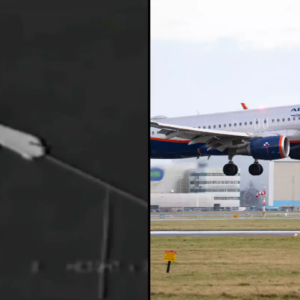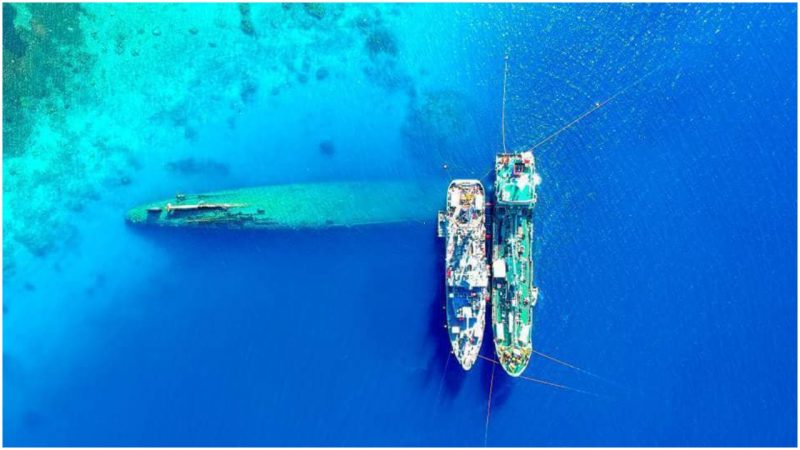
A warship that has been at the bottom of the ocean for more than seven decades has been lightened up considerably by a team of specialists from the U.S. Navy. In an operation that took approximately two years, they removed almost 230,000 gallons of oil that had remained on the ship in 173 tanks.
Originally part of the German Navy, the Prinz Eugen was given to the U.S. after World War II as a victory prize.
The Americans used the ship to learn about the survivability of warships during atomic attacks. It was loaded with cargo and oil, then subjected to two atomic bomb tests, called “Operation Crossroads.” It later sank at the Kwajalein Atoll in the Pacific, after the second test had damaged it.
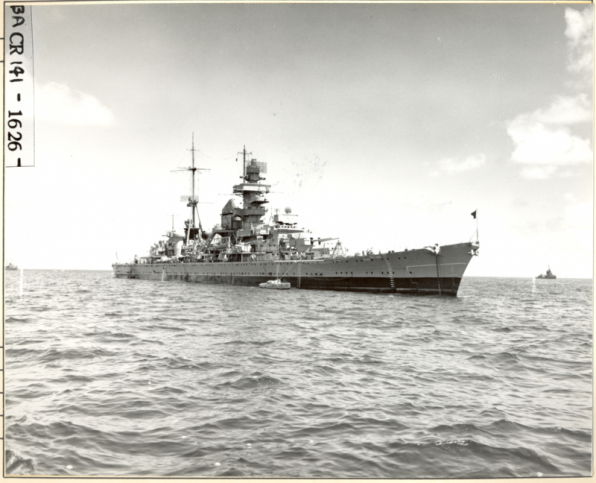
USS Prinz Eugen (IX 300) at sea during Operation “Crossroads”. ¾ view STBD forward.
Heading up the oil salvage project was Stephanie Bocek, a supervisor with the Navy Salvage and Diving Department (SUPSALV). The project was done in conjunction with the U.S. Army Space and Missile Defense Command/Army Forces Strategic Command. The Navy’s salvage vessel USNS Salvor was involved in the operation.
The team spent two years planning and researching the best methods for execution of the mission. First, they selected a firm that could provide a suitable commercial oil tanker to hold the recovered oil and then deliver it to a recycling center. A tanker called the Humber was chosen.
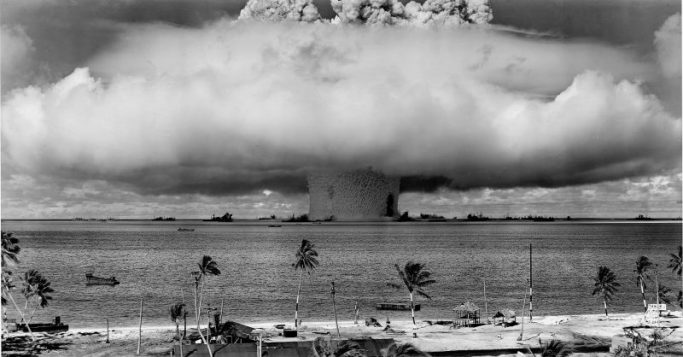
The “Baker” explosion, part of Operation Crossroads, a nuclear weapon test by the United States military at Bikini Atoll, Micronesia, on 25 July 1946.
Humber, in conjunction with Salvor, was placed above the former German vessel so that the extraction of oil could be handled as efficiently and as smoothly as possible.
This maneuver was tricky, because Prinz Eugen was close to shore, so the shallow water meant that the ships’ anchors couldn’t be dropped. Finally, the Army/Navy team decided to have the local harbor tug, the Mystic, collect the anchors and take them to suitably deep water. Then came the task of actually removing the oil from Prinz Eugen‘s tanks.

Prinz Eugen’s launch. Photo: Bundesarchiv, DVM 10 Bild-23-63-14 / CC-BY-SA 3.0
This was accomplished using “hot taps” in which every tank was tapped, then all the retrievable oil was removed. Once empty, each tank was completely sealed, to ensure that no remaining drops of oil could ooze out and contaminate the ocean.
The oil’s presence – even though contained – had presented a threat to the pristine waters surrounding the atoll as the ship deteriorated. Additionally, both the area in general and the wreck of Prinz Eugen specifically are popular with recreational divers, so now the oil presents no risk to them, either.
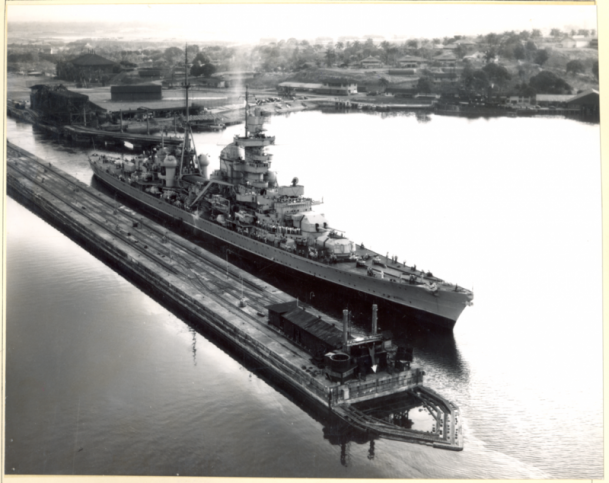
USS Prinz Eugen passing through the Panama Canal in 1946. Note the missing guns on her A turret.
Captain Keith Lehnhardt of SUPSALV, recently said in an interview that “this project was an incredible opportunity to showcase the U.S. Navy salvage community’s capabilities.
SUPSALV had prior experience…so we were well positioned to lead this project. This also serves as an example of exceptional partnership for future oil spill responses, salvage operations, and other emergencies.”
Never before has so much oil been retrieved from a sunken wreck. Whatever lessons can be learned from the extraction could help prevent future accidents from being as severe as a number of those in the past.
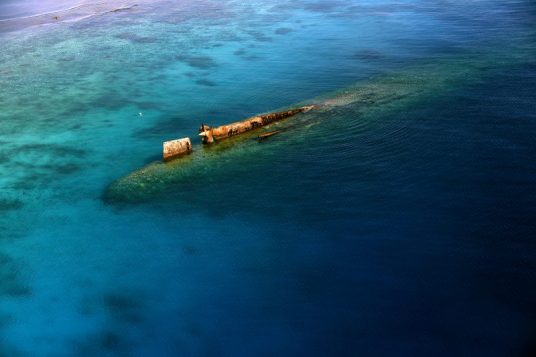
For example, in 1989 the Exxon-Valdez oil spill in Alaska caused millions of gallons of oil to pour into the sea. Crew fatigue and mechanical problems were blamed. The accident caused a major review of the industry, and changes were implemented as a direct result.
More recently, the “Deepwater Horizon” disaster in 2010 spilled millions of gallons of oil into the Gulf of Mexico. It cost 11 lives, and more than 15 people were seriously injured.
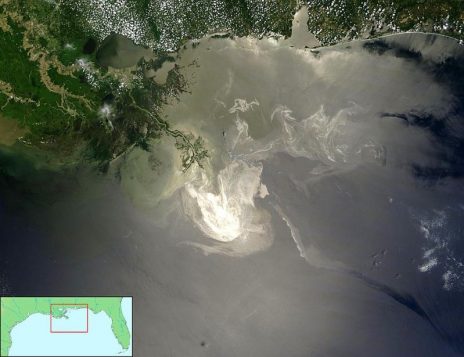
Deepwater Horizon oil spill –
Whenever man and nature collide, there are terrible consequences. In the Deepwater Horizon disaster, the deleterious effects on shorelines, mammals, and sea life were almost incalculable.
Perhaps lessons learned from operations like the oil’s retrieval from the Prinz Eugen can help ensure that man, when venturing to the sea in the future, makes fewer mistakes and causes fewer calamities.
News
The “Red Zone” – Land Still Abandoned Due to the Dangers Left by the First World War
The “Red Zone” – Land Still Abandoned Due to the Dangers Left by the First World War In the aftermath of the First World War, large areas of northeast France were left in ruin. Years of constant siege warfare along…
Before Becoming a Big-Name Actor, Richard Todd was a Paratrooper Who Fought at Pegasus Bridge
Before Becoming a Big-Name Actor, Richard Todd was a Paratrooper Who Fought at Pegasus Bridge Photo Credit: 1. Sgt. Christie, No. 5 Army Film & Photographic Unit / Imperial War Museums / Wikimedia Commons / Public Domain 2. Silver Screen…
The Potsdam Giants: A Prussian Infantry Regiment Of Nothing But Very Tall Soldiers
The Potsdam Giants: A Prussian Infantry Regiment Of Nothing But Very Tall Soldiers Frederick William I inspecting his giant guards known as The Potsdam Giants, a Prussian infantry regiment No 6, composed of taller-than-average soldiers. Frederick William I of Prussia,…
Ellen DeGeneres cuts a very casual figure as she drives around in her Ferrari
Ellen DeGeneres cuts a very casual figure as she drives around Montecito in her Ferrari… while preparing to embark on her stand-up tour Ellen DeGeneres cut a very casual figure as she made her way around Montecito on Tuesday morning. The…
“I’m heavily tattooed and keep getting rejected for jobs – it’s not fair”
Heavily tattooed OnlyFans star, 23, with multiple piercings on her FACE slams TJ Maxx for rejecting her for a job – accusing retailer of unfairly judging her dramatic look A woman has accused TJ Maxx of rejecting her for a…
All 75 passengers killed in plane crash after pilot let his chirldren control the plane
Praying, turning the engine off by accident and letting KIDS play with the controls: The worst blunders made by pilots before a crash revealed Every time we board a plane, we put our lives in the hands of the pilot….
End of content
No more pages to load





